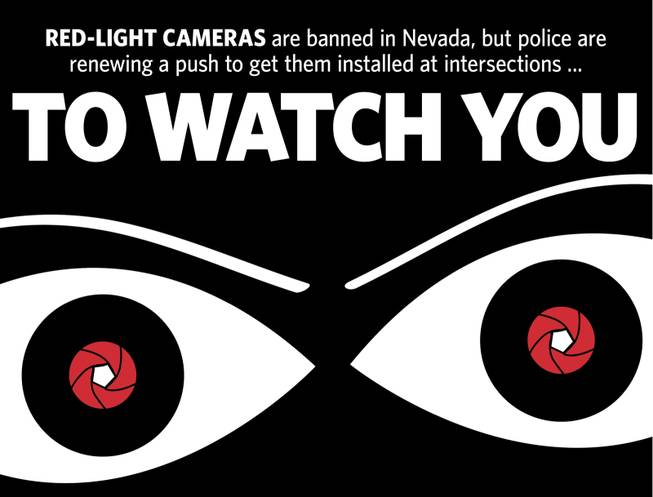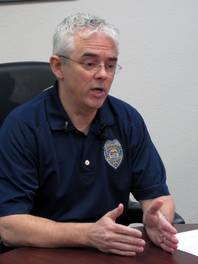
Kyle Ellis / Las Vegas Sun
Saturday, Feb. 5, 2011 | 2 a.m.

Sgt. Tim Bedwell
Beyond the Sun
Sun coverage
The North Las Vegas Police Department has long felt hamstrung in trying to implement a tool that it is confident would save lives. Since 2005, the department has lobbied the state Legislature for permission to post cameras at traffic signals to catch motorists who run red lights.
Police argue that these red-light cameras would prompt motorists to slow down versus speed up when the lights turn yellow, and want permission to conduct a pilot project to learn if that would happen in their city.
But the Legislature, which banned red-light cameras in 1999, has always said no.
With the upcoming legislative session, North Las Vegas police are considering another lobbying push for the pilot project. This time, they may be more emboldened in their efforts.
For starters, a national study convincingly shows that red-light cameras are cutting down on intersection deaths. And for the first time, a state agency — no less than the Nevada Transportation Department — wants the camera ban repealed.
“These fatalities (when running red lights) are an epidemic ... the No. 1 killer for young adults in this country,” said Chuck Reider, director of the Transportation Department’s safety division that is pushing for the bill, AB34.
“That’s why this bill is important.”
The use of red-light cameras has proliferated across the nation, from New York City to Los Angeles. But Nevada lawmakers have denounced these devices as government overreach and a cash cow for municipalities.
To debunk camera detractors, North Las Vegas police have lobbied state lawmakers to place red-light cameras at a few intersections to study their effectiveness.
“We as police officers know the carnage caused by these left turns and T-bones,” North Las Vegas police spokesman Sgt. Tim Bedwell said. “We see it every day, and know how dangerous (red light running) is. If we can bring in a (camera) study that shows results, we can get support from legislators.”
Buttressing the argument for cameras is a study released this week by the Insurance Institute for Highway Safety, which conducted the first nationwide study of red-light fatalities.
The nonprofit group studied 62 cities with populations of more than 200,000, comparing those with red-light cameras with those without. It concluded that cameras have saved hundreds of lives.
Traffic fatalities in 14 cities with red-light cameras fell by 35 percent between the five-year periods 1992-96 and 2004-08, according to the survey. The rate dropped by 14 percent in 48 cities without the cameras.
Researchers estimated that had cameras been operating during the 2004-08 time period in all large cities, 815 deaths could have been prevented.
“The evidence is overwhelming that red-light cameras are effective in making intersections safer,” said Russ Rader, the insurance institute spokesman. “Cities pushing through the controversy to implement camera programs are saving lives. They are making a difference.”
North Las Vegas, Henderson and Metro Police departments say the cameras cause drivers to slow down at yellow lights versus racing through them.
“These cameras are a plus,” Metro Sgt. Richard Strader of the traffic bureau’s fatal detail said. “They work all around the country. Why not here?”
Reider said he hopes repealing the ban on enforcement cameras would prompt a change in driving habits just as laws have reduced smoking and drunken driving.
“Running a red light is no longer acceptable,” he said. “Red-light cameras are an important piece of the puzzle.”
Camera critics cite concerns over privacy and contend that municipalities really want to use the cameras to generate revenue. Others argue red-light cameras infringe upon their due process.
Chad Dornsife, executive director of Best Highway Safety Practices Institute, complains that because violators are identified by cameras, there is a presumption of guilt and no chance for the motorist to confront his accuser. The nonprofit group has lobbied against red-light cameras in Nevada since the issue first arose in the 1990s.
“We feel (the cameras) are illegal and unconstitutional,” he said. “These cameras turn Nevada into a police state. It’s a fraud at best and criminal at worst.”
Answers Bedwell: “It’s really frustrating for us when we hear people arguing about privacy when there are already a lot of cameras in Las Vegas.”
For cash-strapped cities such as North Las Vegas, the red-light cameras would allow officers to focus more of their efforts on non-traffic-related crimes rather than positioning themselves at intersections.
For the past several years, Las Vegas Valley police officers have participated in Joining Forces, a federal grant program that allows smaller municipalities to work together on specific days to implement speed traps, DUI stops and red-light violators.
“We can’t afford more law enforcement so we need to free up the officers that we have to catch the bad guys,” said Erin Breen, director of UNLV’s Safe Community Partnership. “I hope (legislators) take an honest look at the problem and solutions.
“This bill is a viable solution to the red-light problem. It’s gotten out of control in Clark County.”

Join the Discussion:
Check this out for a full explanation of our conversion to the LiveFyre commenting system and instructions on how to sign up for an account.
Full comments policy